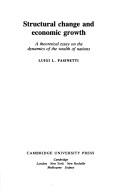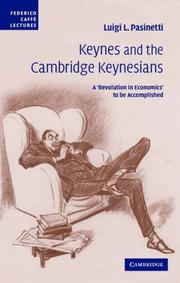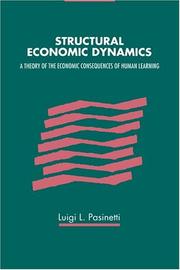| Listing 1 - 10 of 27 | << page >> |
Sort by
|
Book
ISBN: 0231041004 Year: 1977 Publisher: New York Columbia University Press
Abstract | Keywords | Export | Availability | Bookmark
 Loading...
Loading...Choose an application
- Reference Manager
- EndNote
- RefWorks (Direct export to RefWorks)
Book
ISBN: 0231049889 Year: 1980 Publisher: New York Columbia University Press
Abstract | Keywords | Export | Availability | Bookmark
 Loading...
Loading...Choose an application
- Reference Manager
- EndNote
- RefWorks (Direct export to RefWorks)
Book
ISBN: 0312004176 Year: 1987 Publisher: New York
Abstract | Keywords | Export | Availability | Bookmark
 Loading...
Loading...Choose an application
- Reference Manager
- EndNote
- RefWorks (Direct export to RefWorks)
Periodical
Publisher: Oxford
Abstract | Keywords | Export | Availability | Bookmark
 Loading...
Loading...Choose an application
- Reference Manager
- EndNote
- RefWorks (Direct export to RefWorks)
Book
ISBN: 052123607X 9780521236072 Year: 1981 Publisher: Cambridge: Cambridge university press,
Abstract | Keywords | Export | Availability | Bookmark
 Loading...
Loading...Choose an application
- Reference Manager
- EndNote
- RefWorks (Direct export to RefWorks)

ISBN: 0521274109 9780521274104 Year: 1983 Publisher: Cambridge: Cambridge university press,
Abstract | Keywords | Export | Availability | Bookmark
 Loading...
Loading...Choose an application
- Reference Manager
- EndNote
- RefWorks (Direct export to RefWorks)
Economic growth --- Economics --- Economic development --- Statics and dynamics (Social sciences) --- Mathematical models. --- 330.35 --- 330.3 --- AA / International- internationaal --- 330.00 --- 338.8 --- Economische groei. Kwantitatieve toename. Technische vooruitgang --zie ook {338.09} --- Dynamiek der staatshuishouding. Economische bewegingen. Economische dynamica --- Economische en sociale theorieën: algemeenheden. --- Economische groei. --- 330.3 Dynamiek der staatshuishouding. Economische bewegingen. Economische dynamica --- 330.35 Economische groei. Kwantitatieve toename. Technische vooruitgang --zie ook {338.09} --- Economische en sociale theorieën: algemeenheden --- Economische groei --- Economic development - Mathematical models.
Book
ISBN: 0521204747 9780521204743 Year: 1974 Publisher: London: Cambridge university press,
Abstract | Keywords | Export | Availability | Bookmark
 Loading...
Loading...Choose an application
- Reference Manager
- EndNote
- RefWorks (Direct export to RefWorks)
Economic growth --- Income --- croissance economique --- revenus --- theories economiques --- economische groei --- inkomens --- economische theorieen --- Economic development --- Economics --- Income distribution --- Distribution of income --- Income inequality --- Inequality of income --- Distribution (Economic theory) --- Disposable income --- Economic theory --- Political economy --- Social sciences --- Economic man --- Development, Economic --- Growth, Economic --- Economic policy --- Statics and dynamics (Social sciences) --- Development economics --- Resource curse --- Economic development. --- Economics. --- Income distribution.

ISBN: 9780521872270 0521872278 Year: 2007 Publisher: Cambridge: Cambridge university press,
Abstract | Keywords | Export | Availability | Bookmark
 Loading...
Loading...Choose an application
- Reference Manager
- EndNote
- RefWorks (Direct export to RefWorks)
What was the Keynesian revolution in economics? Why did it not succeed to the extent that Keynes and his close pupils had hoped for? Keynes and the Cambridge Keynesians addresses these and other questions by tracing the historical development of Keynesian economics. The book is split into three parts. Part I contains the author's Caffe Lectures on Keynes's 'unaccomplished revolution'. Part II is a series of biographical essays where the author, himself a witness and participant of the group on which he writes, presents the successful and unsuccessful endeavours of Keynes's most important pupils: Richard Kahn, Joan Robinson, Nicholas Kaldor, Pierro Sraffa and Richard Goodwin. Part III of the book looks to the future by developing a conceptual analytical framework that makes sense of Keynes's 'revolution in economics', discussing the many ways in which the Keynesian way of doing economics is incompatible with the neoclassical tradition.
Economic schools --- Keynes, John Maynard --- Keynesian economics. --- Keynesian economics --- Economists --- Keynésianisme --- Economistes --- History. --- Biography. --- Histoire --- Biographie --- Keynes, John Maynard, --- History --- AA / International- internationaal --- 330.47 --- -Economists --- -330.156 --- Social scientists --- Post-Keynesian economics --- Schools of economics --- Keynes en zijn school. --- Keĭns, Dzhon Maĭnard, --- Kʻai-yin-ssŭ, --- Kʻai-en-ssu, --- Keynes, J. M. --- Kenis, C. M., --- Keyns, C. M., --- Keynésianisme --- 330.156 --- Keynes en zijn school --- Keynes, J. Maynard --- Keynes, J.M. --- Keynesian economics - History --- Economists - Biography --- Keynes, John Maynard, - 1883-1946

ISBN: 0521432820 0521029767 0511551444 9780521432825 9780511551444 9780521029766 Year: 1993 Publisher: Cambridge: Cambridge university press,
Abstract | Keywords | Export | Availability | Bookmark
 Loading...
Loading...Choose an application
- Reference Manager
- EndNote
- RefWorks (Direct export to RefWorks)
This book is a theoretical investigation of the influence of human learning on the development through time of a 'pure labour' economy. The theory proposed is a simple one, but aims to grasp the essential features of all industrial economies. Economists have long known that two basic phenomena lie at the root of long-term economic movements in industrial societies: capital accumulation and technical progress. Attention has been concentrated on the former. In this book, by contrast, technical progress is assigned the central role. Within a multi-sector framework, the author examines the structural dynamics of prices, production and employment (implied by differentiated rates of productivity growth and expansion of demand) against a background of 'natural' relations. He also considers a number of institutional problems. Institutional and social learning, know-how, and the diffusion of knowledge emerge as the decisive factors accounting for the success and failure of industrial societies.
Economic production --- Technological innovations --- Diffusion of innovations --- Production (Economic theory) --- Economic development --- Labor productivity --- Economic aspects. --- Diffusion of innovations. --- Economic development. --- Labor productivity. --- Production (Economic theory). --- Business, Economy and Management --- Economics --- Technological innovations - Economic aspects. --- Development, Economic --- Economic growth --- Growth, Economic --- Economic policy --- Statics and dynamics (Social sciences) --- Development economics --- Resource curse --- Microeconomics --- Supply and demand --- Demand (Economic theory) --- Supply-side economics --- Innovations, Diffusion of --- Acculturation --- Communication --- Culture diffusion --- Labor output --- Productivity of labor --- Industrial productivity --- Capital productivity --- Hours of labor --- Labor time --- Productivity bargaining
Book
ISBN: 0333276132 9780333276136 0333225570 9780333225578 Year: 1979 Publisher: London: MacMillan,
Abstract | Keywords | Export | Availability | Bookmark
 Loading...
Loading...Choose an application
- Reference Manager
- EndNote
- RefWorks (Direct export to RefWorks)
Production (Economic theory) --- Production (Economic theory). --- production --- Economic conditions. Economic development --- Microeconomics --- Supply and demand --- Demand (Economic theory) --- Supply-side economics --- productie
| Listing 1 - 10 of 27 | << page >> |
Sort by
|

 Search
Search Feedback
Feedback About UniCat
About UniCat  Help
Help News
News